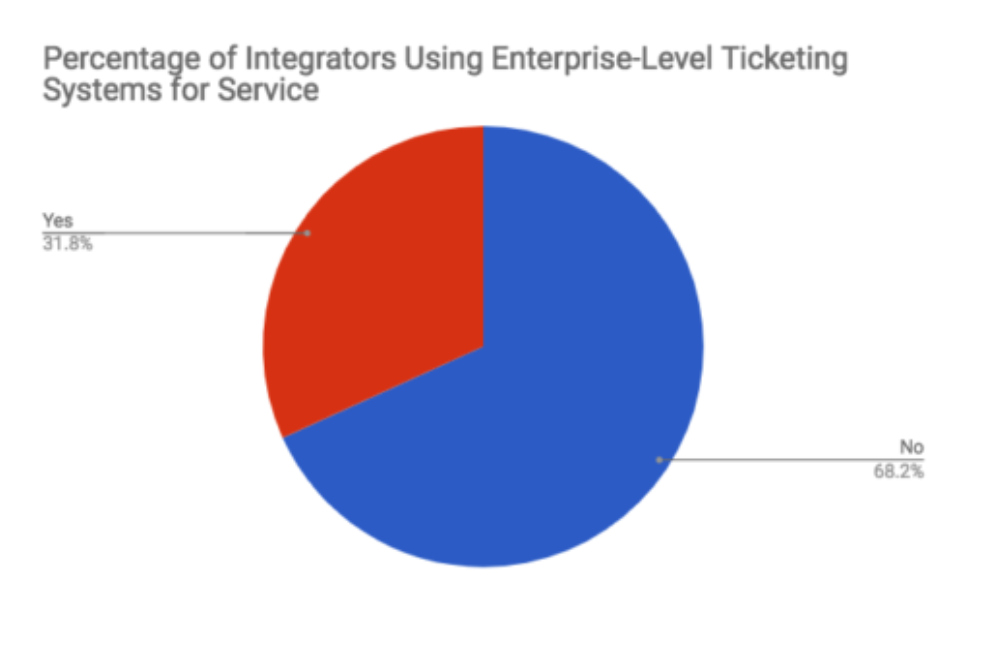Using piecemeal solutions instead of a proper ticketing system to manage your service may be hampering your client experience.
Ticketing systems are one of the most important pieces of software used by top service providers and customer support operations. These systems allow teams to capture, manage, and track the status of customer issues in an organized and highly-collaborative manner.
Yet, in spite of the vital role these programs play in providing excellent service, a survey conducted by OneVision indicates that only about 1-in-3 companies are using an enterprise-class ticketing system.

In part, this is due to a misunderstanding about what a proper ticketing system is and how it can help your business. Many integrators are using work order software, project management software, invoicing tools, or even email to perform piecemeal ticketing functions.
While your service operations may be able to function at a base level using such solutions, they do not come close to matching the functionality of a proper ticketing system.
Here are the top five reasons that you should adopt a ticketing system in your business right away.
1. Nothing Falls Through the Cracks
When using piecemeal solutions like email to manage service events, it is only a matter of time until someone drops the ball. By their very nature, ticketing systems are designed to ensure this never happens.
Easy access to the system from web browsers as well as mobile apps, combined with the ability to communicate with clients from within the platform, ensure that all of your service information in a centralized and collaborative workspace. This provides shared visibility which makes it far less likely that a service request will go unanswered or unresolved.
Software features like automated reminders and workflow triggers can also be setup to ensure that 100 percent of your company’s service requests are responded to in a timely manner and brought to a full resolution.
2. Detailed Service History
Using piecemeal solutions for ticketing also results in service data being scattered across multiple users/systems or even worse, trapped in the heads of individual team members.
Ticketing systems, on the other hand, provide teams with an organized and searchable history of service events.
This information can greatly improve your team’s troubleshooting efficiency by providing visibility to past service events and what was done to resolve them. This historical service data can also be very helpful if, for any reason, you need to provide your client with a detailed history of what actions were taken, when, and by whom.
3. Seamless Multi-Channel Support
Different clients have different ways they prefer to communicate. Some prefer to call anytime they experience an issue while others prefer email. Some clients are also starting to gravitate towards text messaging. In the near future, many clients may also request other avenues of support from your team such as instant messaging or even social media.
Proper ticketing systems are designed to function seamlessly in this “multi-channel” environment. This means your clients can communicate in the way they prefer, while all of the requests are still funneled in a centralized system for tracking, management, and analysis.
4. Service Metrics
Ticketing systems come with the built-in ability to track vital service metrics such as average first reply time, ticket resolution time, requester submission method, and much more. These baseline metrics form the foundation for tracking the efficacy of any service/support team.
Using piecemeal solutions in place of a proper ticketing system is like sending your crew to do a rough-in with dull drill bits… Instead, invest in providing your service team the tools they need to provide your clients with a consistent, world-class service experience.
Custom reporting and dashboards can also be setup to track just about any metric you can imagine. For example, at OneVision we track metrics such as what system an issue was related to (i.e. lighting, control, network, etc), remote vs. on-site solve rates, and urgency de-escalations (i.e. were we able to avoid a night/evening truck roll through either resolving the ticket or providing a workaround).
Over time, these metrics become incredibly useful in optimizing your service strategies.
5. Collaboration
Last but most certainly not least, ticketing systems allow for a high level of collaboration across your organization. The shared visibility provided by a ticketing system allows multiple members of your team to exchange critical information which can help you resolve more issues in less time.
Multiple team members can seamlessly work towards resolving the same issue which is extremely helpful for service events that span multiple calls, emails, or site visits. Detailed notes and historical information also help foster the sharing of service best practices across your company.
Stames is the right choice
Whether you are embarking on a massive sales and marketing campaign and want to manage your leads, want a software for internal use, want to manage your customer relationship or assets etc, Stames is the ideal choice.
Stames offers a 60 days free trial. No credit cards needed. No hidden fees. Just instant access. Pricing after trial starts from $29/ month with no restrictions on number of agents or users. Get started with an account today here.





No Comments